Publications
For submission of articles or Working Papers to CEsA, please send an email to:
comunicacao@cesa.iseg.ulisboa.pt
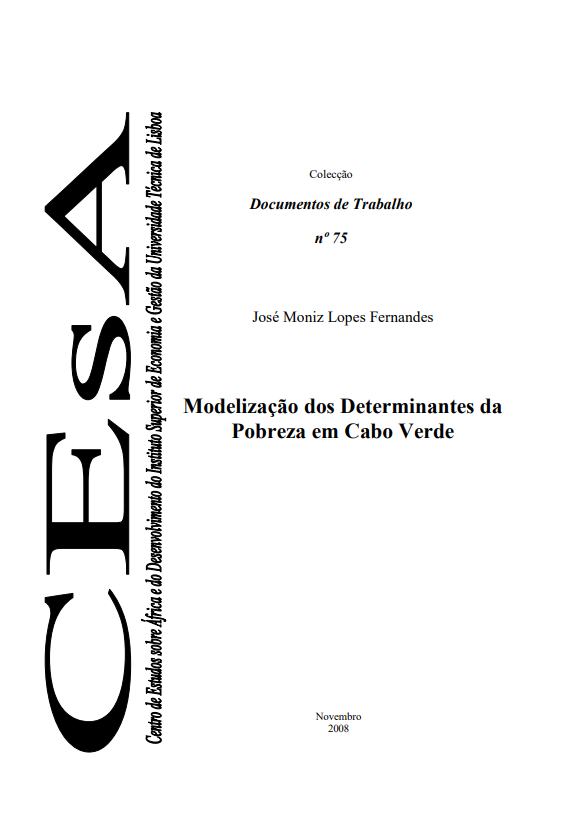
Working Paper 75/2008: Modelização dos determinantes da pobreza em Cabo Verde
Abstract:
The poverty profile gives information about who is poor, but it cannot be used to accurately assess the determinants of poverty. One of the advantages of the determinants of poverty is the impact of several variables on the probability of being poor while controlling for other regression variables. In Modelização dos determinantes da pobreza em Cabo Verde, regression analysis is performed taking into account the means of residence (urban and rural). The database used is from the Survey on Family Expenses and Income (IDRF) prepared by the National Statistics Institute (INE) in 2001/02. This article corresponds to a sub-chapter of the dissertation entitled “Poverty in Cape Verde: a contribution to multidimensional modelling”, presented by Fernandes, J. Moniz, (2004), as a partial requirement to obtain a Master’s degree in Statistics and Information Management, by the Instituto Superior de Estatística e Gestão de Informação of the Universidade Nova de Lisboa. On the one hand, the aim of this study is to model household poverty levels on the Cape Verde islands. On the other hand, it is hoped to contribute to identifying a set of variables that better explain the phenomenon of poverty in Cape Verde and eventually provide the social authorities (National Programme for the Fight Against Poverty – PNLP and Directorate General of Planning) with important information for decision making.
Quotation:
Fernandes, José Moniz Lopes. 2008. “Modelização dos determinantes da pobreza em Cabo Verde”. Instituto Superior de Economia e Gestão. CEsA – Documentos de Trabalho nº 75/2008.
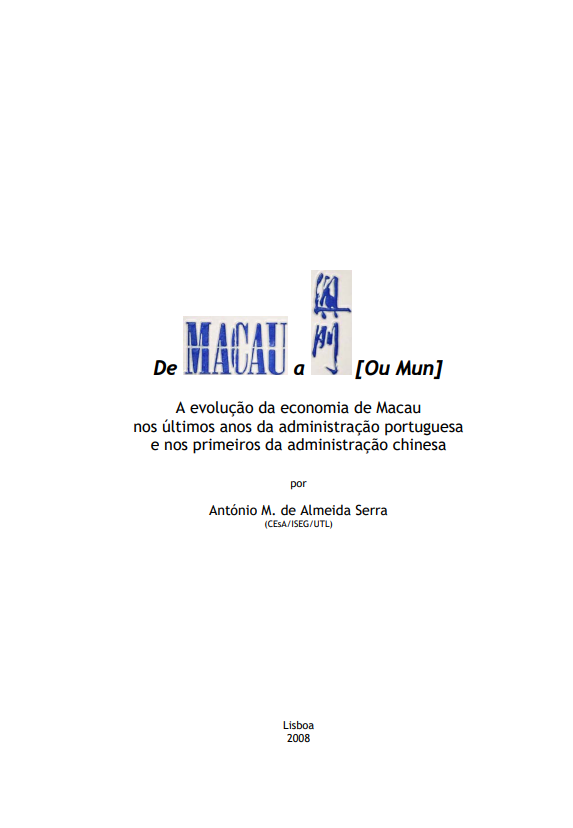
Working Paper 74/2008: De Macau a Ou Mun: a evolução da economia de Macau nos últimos anos da administração portuguesa e nos primeiros da administração chinesa
Abstract:
De Macau a Ou Mun: a evolução da economia de Macau nos últimos anos da administração portuguesa e nos primeiros da administração chinesa is a (much) revised and enlarged version of another one entitled “Casino Macau”, published by CEsA in 2006 as one of its Working Papers. However, substantial changes to the points of view advanced in the initial document are not expected. They are (almost) all of them already there, and we are now concerned with going deeper into documenting the ideas presented and approaching, with appropriate statistical information, the economic evolution of Macau in the last years of the Portuguese administration and in the first of the Chinese administration. What was essential in this deepening of the initial text was the possibility of approaching these issues with specialists resident in Macau through interviews carried out on site in June/2007 and a more in-depth treatment of the available statistical information. The text was written, essentially in 2007, but for various reasons it is only now possible to publish it. At the end there is a post-scriptum that gives some more current information (September/2008).
Quotation:
Serra, António M. de Almeida. 2008. “De Macau a Ou Mun: a evolução da economia de Macau nos últimos anos da administração portuguesa e nos primeiros da administração chinesa”. Instituto Superior de Economia e Gestão. CEsA – Documentos de Trabalho nº 74/2008.
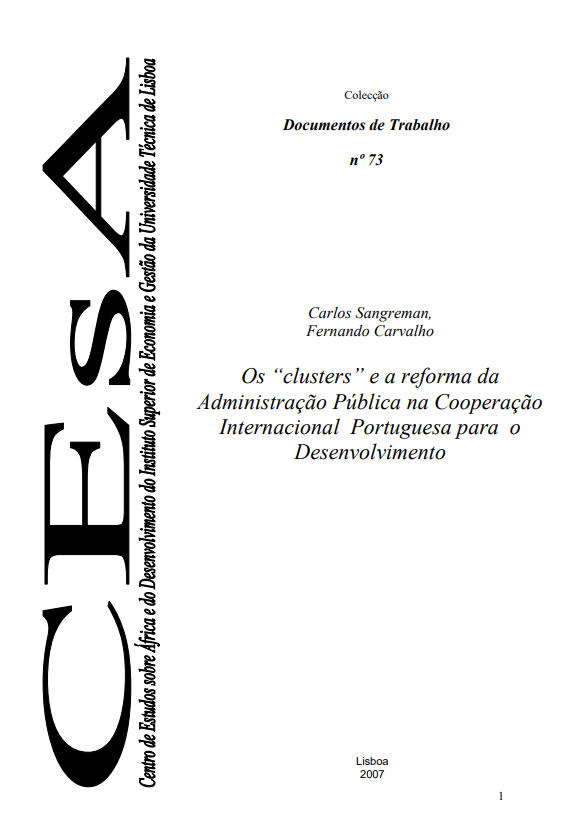
Working Paper 73/2007: Os ‘clusters’ e a reforma da Administração Pública na cooperação internacional portuguesa para o desenvolvimento
Abstract:
The objective of Os ‘clusters’ e a reforma da Administração Pública na cooperação internacional portuguesa para o desenvolvimento is to be a contribution to the knowledge in theory and in the practical operationalization of the new instrument of Portuguese cooperation for development – the cooperation clusters – with regard to the beneficiary countries of international aid and also in the effect that its creation and implementation can have on the reform of public and private cooperation institutions in Portugal, especially at the Institute for Development Support (IPAD) in what we call the “boomerang effect”. As for the theoretical dimension, we argue that only linking this concept to that of benchmarking, as understood in the ongoing Public Administration reform process, will make it possible to make it a real policy measure – as opposed to virtual measures announced and never operationalized – and with an innovative contribution to the reform of public institutions and non-state actors that constitute the actors in the field of Portuguese Cooperation (PC), within the current international consensus on the area and in the current Government’s Public Administration Reform policy. As for practical operationalization, we defend an implementation, perfectly feasible and not utopian, which involves a flexible operational model with which to develop cooperation programs suited to the priorities existing in each country, using the methodology of partnership and evaluation of results that are of the highest quality and as participatory as possible in all phases of identification, design, implementation and evaluation, always taking into account the political options of Portugal and the partner countries, as well as the coherence, consistency and institutional capacity of both. Experiences from other countries that finance the Cooperation were sought, as well as mentioning the cluster whose conception is more advanced in Portugal – the Island of Mozambique -, and presenting proposals for the operationalization of clusters that may constitute a standard of what Portugal can propose to countries with which have cooperation. These proposals also extend what we think can be the transformation in Portuguese institutions of the “countryside” in the light of the ideas expressed here.
Quotation:
Sangreman, Carlos e Fernando Carvalho. 2007. “Os ‘clusters’ e a reforma da Administração Pública na cooperação internacional portuguesa para o desenvolvimento”. Instituto Superior de Economia e Gestão. CEsA – Documentos de Trabalho nº 73/2007
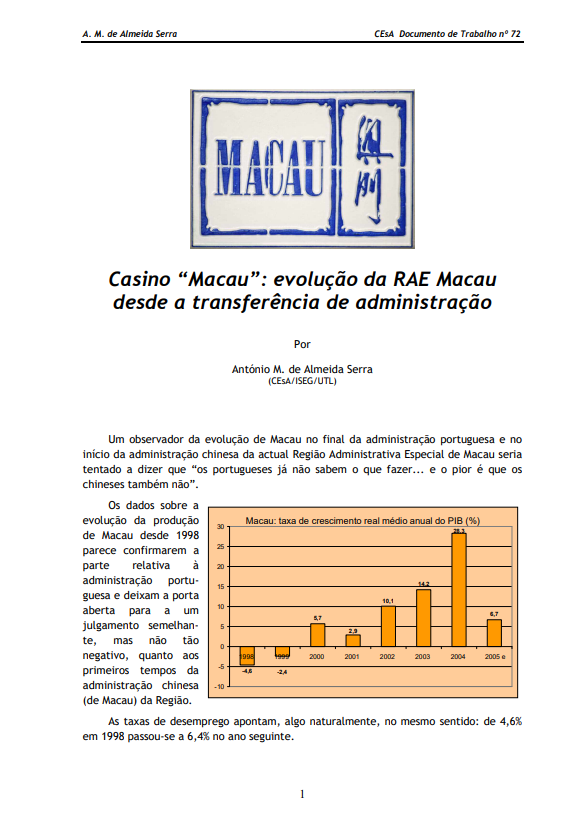
Working Paper 72/2006: ‘Casino Macau’: evolução da RAE Macau desde a transferência de administração
Abstract:
Casino Macau’: evolução da RAE Macau desde a transferência de administração is mainly intended to constitute a tour d’horizon on the main lines of evolution of Macau after the transfer of its administration to the People’s Republic of China. This, as is known, took place at zero hours of December 20, 2000, a date chosen to ensure that the transfer of administration took place after that of Hong Kong, a “point of honor” on the Portuguese side, as it ensured that Portugal , the first European country to arrive in Asia, would be the last to leave. The difficulties that the territory’s economy experienced in the last years of the Portuguese administration (see the unemployment rates and negative growth rates that occurred at the time and which were due, in part, to phenomena outside Macau such as the Asian crisis of 1997-98) could justify extending this line of “break” with the past to the economy, even within the general framework of the commitment to “one country, two systems”. Those economic difficulties would most likely be felt even without an unfavorable international economic context due to the exhaustion of what we could call the “model of great works” that had characterized the economic policy implemented by Portugal, particularly from the governments of the Comte. Almeida e Costa (1981-86), who prepared many of the projects to be implemented and who would have been the real outliner of Macau’s future as a “Chinese territory under Portuguese administration, and Carlos Melancia (1987-90), who was responsible for carrying out many of the planned works and others. It was in this context that, with the (illusory?) objective of giving Macau a relative autonomy vis-à-vis Hong Kong and even the contiguous area of People’s China (Guangdong/Canton province) that it reduced its dependence on its neighbors , the construction of various infrastructures was launched (namely the airport, the port and the power station, but also bridges connecting the Macau peninsula and the island of Taipa) and agreements were negotiated with institutions outside Macau — namely international organizations such as the European Union, the GATT, etc.
Quotation:
Serra, António M. de Almeida. 2006. ‘Casino Macau’: evolução da RAE Macau desde a transferência de administração”. Instituto Superior de Economia e Gestão. CEsA – Documentos de Trabalho nº 72/2006.
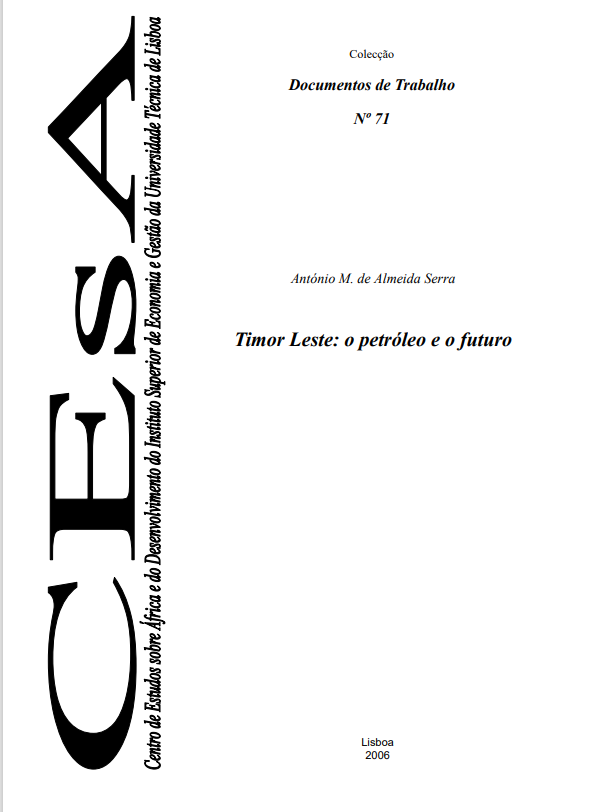
Working Paper 71/2006: Timor Leste: o petróleo e o futuro
Abstract:
Timor Leste: o petróleo e o futuro has as its fundamental objective the presentation of the main information on the “petroleum economy” of East Timor, clearly assuming a more descriptive function than a critical analysis of it. For this reason, it should not be understood as a “scientific communication” to the VI EELP. It highlighted the difficulties that the country has faced in its negotiations with Australia to define its share of resources in the Timor Sea, which in its opinion should correspond to 100% since the main producing wells will be in its area. exclusive economic activity defined in accordance with the International Law of the Sea. Unfortunately, it was not possible to convince Australia of the goodness of this position and it ends up appropriating an important volume of resources that should belong to East Timor. One of the consequences of this is that Australia ends up financing part of its international aid to East Timor… with money improperly appropriated from it!… We also pointed out that the resources currently available are much greater than initially estimated due to the significant increase of oil prices on the international market. Furthermore, these resources can be greatly increased if, as is believed, the existence of oil both onshore and offshore is confirmed, but in the area where the total and complete sovereignty of Timor is unequivocally recognized. Finally, we mention that, materializing the desire to preserve most of the country’s oil wealth for future generations, the Government decided to establish a Petroleum (financial) Fund applied only abroad in order to avoid “Dutch disease” reactions in the country. national economy. The benefits for the present generations will be those that will come from the financing, by the Fund, of the General State Budget and of the expenses (namely of development) covered by it. These transfers will represent almost 2/3 of the Budget’s revenues and will amount to approximately USD 140 million in the next fiscal year (2006/07), then decreasing to approximately USD 110 million in the following three years.
Quotation:
Serra, António M. de Almeida. 2006. “Timor Leste: o petróleo e o futuro”. Instituto Superior de Economia e Gestão. CEsA –Documentos de Trabalho nº 71/2006.
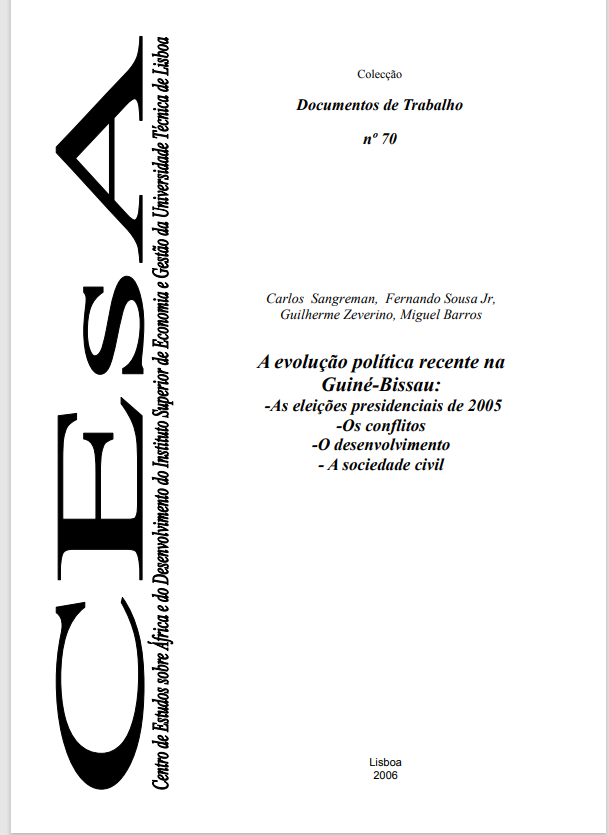
Working Paper 70/2006: A evolução política recente na Guiné-Bissau: as eleições presidenciais de 2005, os conflitos, o desenvolvimento, a sociedade civil
Abstract:
The purpose of A evolução política recente na Guiné-Bissau: as eleições presidenciais de 2005, os conflitos, o desenvolvimento, a sociedade civil is to contribute to the identification of some of the main social and political reasons of the Guinea-Bissau reality that were decisive in the electoral behavior that led to the election in 2005 of João Bernardo Vieira “Nino” for the presidency of the Republic against the candidate nominated and supported by PAIGC, Malam Bacai Sanhá. We tried to combine the previous knowledge of the country, through academic activity and technical work in the field on different occasions, with the attentive observation of the electoral process, including the presence of two of the authors’ team members in the Observation Mission of the international community in the elections, to to analyze various aspects of the evolution of that country that are considered relevant for the population of around 600,000 voters to elect Nino Vieira president, after having lost an eleven-month civil war and exile in Portugal since 1999. The evolution process of development human and sustained, the role of civil society in this process and the social and military conflicts are themes that seem to us to be significant – although not exhaustive – for this result. We are aware that it will be necessary to bring together different analyzes by researchers with different training on other topics until we have a broad and in-depth perspective on all possible aspects of the evolution of the individual and collective well-being of the population of that country. The conclusions stem from scenarios that we believe are possible, at the time of writing, for the near future and that we will complete as our perception of reality develops with contributions from other authors in articulation or not with this team. For these texts, we have the aggregated results by presidential candidate from the 1994, 1999 and 2005 elections, as well as their breakdown by region in the second round. We also have access to a bibliography of authors from Guinea and other nationalities on the electoral phenomenon, development, conflicts, civil society and our own knowledge of the country’s reality. We are not aware of opinion polls on electoral behavior in the country. The investigation we carried out on the polls carried out in the 2005 campaign reveals that these were just propaganda actions for different candidacies and did not follow any methodology that would allow them to be considered the expression of some representation.
Quotation:
Sangreman, Carlos … [et al.]. 2006. “A evolução política recente na Guiné-Bissau: as eleições presidenciais de 2005, os conflitos, o desenvolvimento, a sociedade civil”. Instituto Superior de Economia e Gestão. CEsA – Documentos de Trabalho nº 70/2006
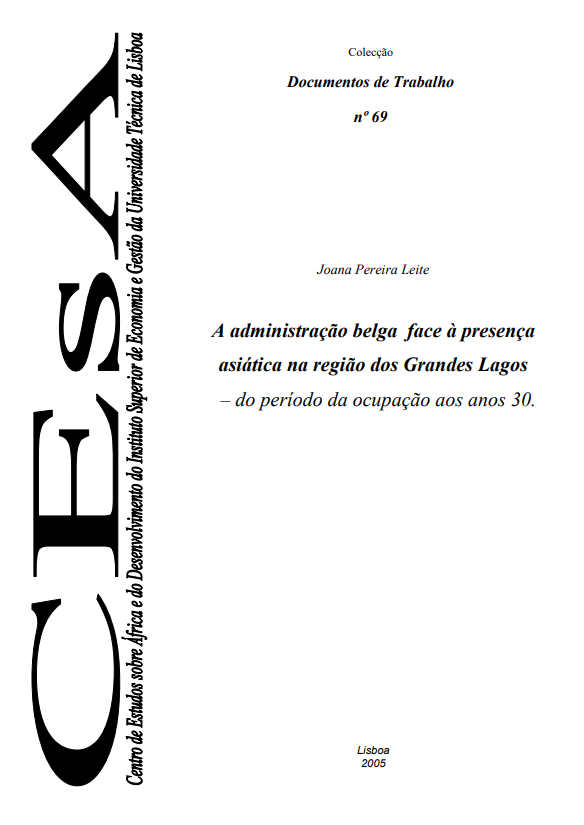
Working Paper 69/2005: A administração belga face à presença asiática na região dos Grandes Lagos: do período de ocupação aos anos 30
Abstract:
In A administração belga face à presença asiática na região dos Grandes Lagos: do período de ocupação aos anos 30 we study how the Asian question presents itself as one of the dominant themes of colonial management in East, Central and Eastern and Southern Africa during the 20th century. The settlement in those territories of peoples from the Arabian Peninsula, the Persian Gulf and the Indian subcontinent, a heritage transmitted to the African societies of the western Indian Ocean during more than a millennium of transoceanic contacts, constituted, in the first decades of European occupation, a common feature of both their human and cultural landscape as well as its economic life. By the 1930s, therefore, the administration’s intention to manage the interests of the Asian community was visible. Indeed, in a colonial context in which the majority of the African population was reserved, above all, the function of producing, emigrating and fulfilling tax obligations, given the inexistence of white colonization and, finally, given the limited presence of small European commerce, namely of Greek, Italian and Indo-Portuguese origin, it was Arab and Hindu traders who, for the most part, would be called upon to assume the internal dynamism of commercial activity. Hence the importance that these Asians assume in the history of Belgian occupation in the Great Lakes region.
Quotation:
Leite, Joana Pereira. 2005. “A administração belga face à presença asiática na região dos Grandes Lagos: do período de ocupação aos anos 30”. Instituto Superior de Economia e Gestão. CEsA – Documentos de Trabalho nº 69/2005.
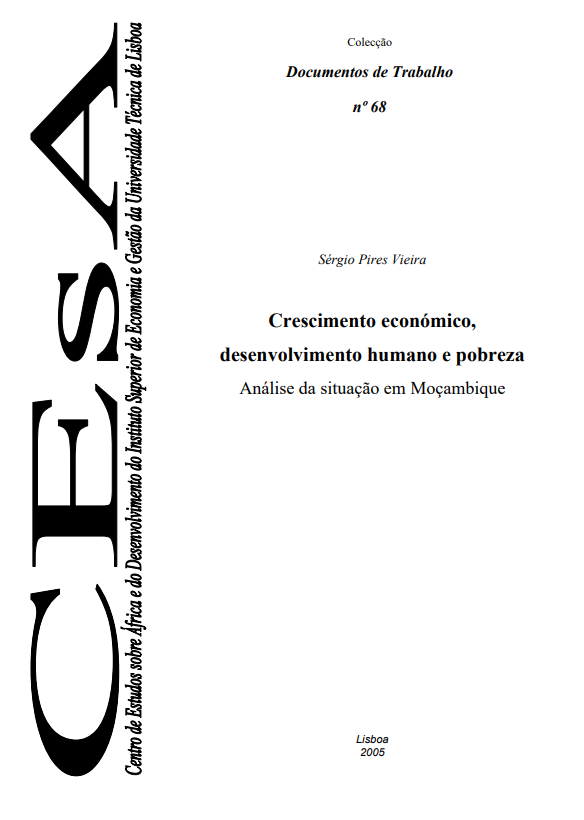
Working Paper 68/2005: Crescimento económico, desenvolvimento humano e pobreza: análise da situação em Moçambique
Abstract:
Starting from the case of Mozambique, the main objective of Crescimento económico, desenvolvimento humano e pobreza: análise da situação em Moçambique is to discuss the connection between economic growth and poverty reduction. To this end, we will confront different perspectives and outcomes of poverty in Mozambique. At first, it will be inevitable to start a previous discussion on some conceptual and methodological aspects. The first section of this work will therefore be entirely devoted to a discussion around the definition, identification and measurement/aggregation of poverty. For poverty reduction, growth alone is not a sufficient condition. The nature of the growth is also important. In the case of Mozambique, economic growth was favorable to the poorest strata and would certainly have been favored by a good orientation of social policies, although this issue remains to be analyzed in detail. To better understand the causal processes that make it possible to establish a relationship between growth and poverty reduction, more complete data at the macro level would be needed, as well as a deeper micro knowledge of family strategies (livelihood) in the face of macroeconomic transformations. However, it is already possible to perceive that the strong reduction of poverty in the rural sector compared to the urban sector clearly reflects an economic growth more favorable to rural populations, where poverty has a higher incidence. It can thus be considered that the sectoral economic growth less biased to the detriment of rural areas, contrary to what happened in the past, was positive in reducing absolute poverty. On the other hand, the human development index and the human poverty index reflect the importance of investments made in human capital, particularly in the education sector.
Quotation:
Vieira, Sérgio Pires. 2005. “Crescimento económico, desenvolvimento humano e pobreza: análise da situação em Moçambique”. Instituto Superior de Economia e Gestão. CEsA – Documentos de Trabalho nº 68/2005
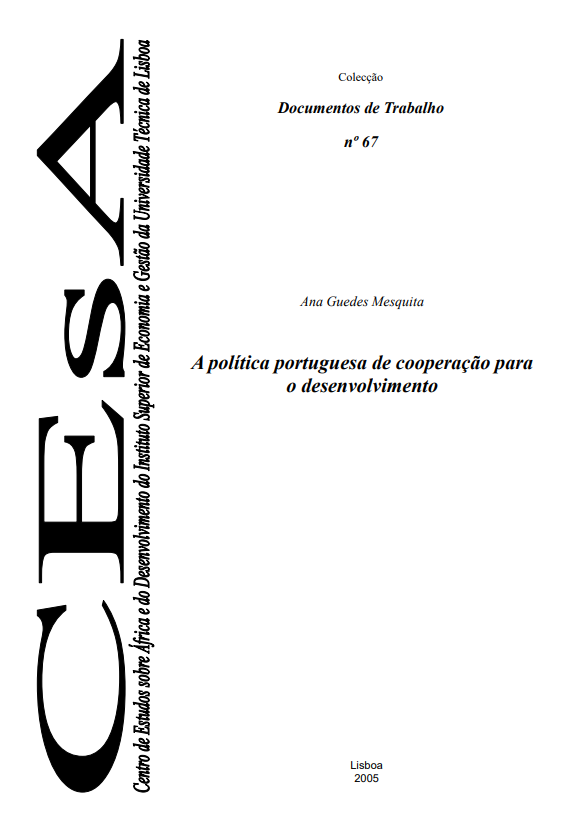
Working Paper 67/2005: A política portuguesa de cooperação para o desenvolvimento
Abstract:
In A política portuguesa de cooperação para o desenvolvimento it is studied how the development cooperation policy is often described as an essential vector of Portuguese foreign policy, acquiring, to that extent, particular strategic significance. In this sense, and based on the analysis of the main lines of Portuguese foreign policy, the importance given to strengthening relations with the Portuguese-speaking space stands out, namely through the projection of values and interests in the PALOP, Brazil and Timor (MNE, 2003a), as well as the defense and affirmation of the Portuguese language and culture, aspects that, according to the XV Government Program (2002-2004), contribute to the affirmation of national identity. The Portuguese language and culture are considered main strategic elements (language is a decisive factor in the new world order through the geopolitics of language), and, in this plan, Portugal is proportionally more relevant on a planetary scale than in its political dimensions, social or economic. In the general lines of external action, this aspect is more easily perceptible. The acceleration of European integration and the blurring of borders in Europe must correspond to a greater affirmation of national identity, expressed in the projection, both internally and externally, of the Portuguese language and culture and in the valorization of the historical legacy: “the cultural factor is perhaps a of the most powerful elements of our identity, which is, after all, what separates and differentiates us from all other peoples in globalization on a world scale” (MNE, 2003b). Thus, it seems fundamental for Portuguese foreign policy to know how to reconcile two of its main axes: maintaining a close connection to the community of Portuguese-speaking countries in the world, on the one hand, and active participation in European construction, on the other. As for the cooperation policy, this is simultaneously seen as a vehicle for the affirmation and expansion of Portuguese influence at an international level and as an instrument for achieving national strategic objectives.
Quotation:
Mesquita, Ana Guedes. 2005. “A política portuguesa de cooperação para o desenvolvimento”. Instituto Superior de Economia e Gestão. CEsA – Documentos de Trabalho nº 67/ 2005
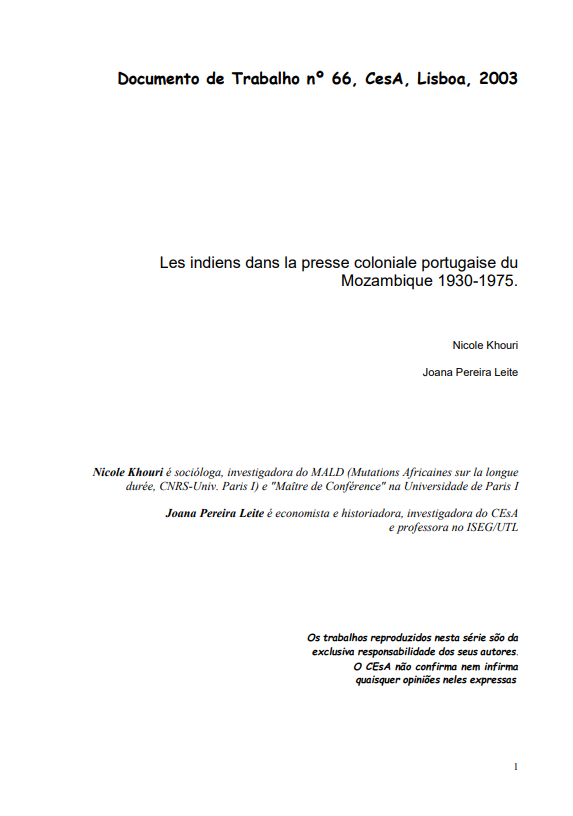
Working Paper 66/2003: Les indians dans la presse coloniale portuguaise du Mozambique 1930-1975
Abstract:
In order to organize an intelligible reading of the facts and events reported by the Laurentian press between 1930 and 1975, we started from a hypothesis which, for ideological reasons linked to the form taken by Salazarist nationalism and its avatars, had difficult to express in a simple and explicit way. This starting hypothesis concerned the nature of the Estado Novo which defined for the first time in the history of the Portuguese Empire, a social and cultural field common to the different groups constituting the society of the colony, of which the Indians were stakeholder. This hypothesis, which we tested in Les indians dans la presse coloniale portugaise du Mozambique 1930-1975 through the Laurentian press from the 1930s to 1975, is confirmed by the concrete measures taken by the government of the colony vis-à-vis the entire Indian community. Nevertheless, the latter remained vulnerable to the discriminatory practices specific to colonial society whenever political events threatened the Empire. We have noted that this vulnerability was experienced in a differentiated way according to religious affiliations (Hindu, Muslim and Catholic), according to the status conferred by the authorities (Indo-Portuguese, Indo-British then Pakistani, Hindustani and Indo-Portuguese) and according to the place occupied in socio-economic stratification. This overview and analysis of the Laurentian press during the Estado Novo period shed light on the understanding of the dual destiny of the Indian community, both in Portugal and in Mozambique from 1975 onwards. shared all the signs of cultural assimilation to the Portuguese nation, and that it was not reduced to the sole role of “middleman” or economic agent in its experience within colonial society, that it can henceforth directing its destiny either in Portugal or/and in the Mozambican nation which remains to be built.
Quotation:
Khouri, Nicole e Joana Pereira Leite . 2003. “Les indians dans la presse coloniale portugaise du Mozambique 1930-1975”. Instituto Superior de Economia e Gestão. CEsA –Documentos de Trabalho nº 66/2003.





